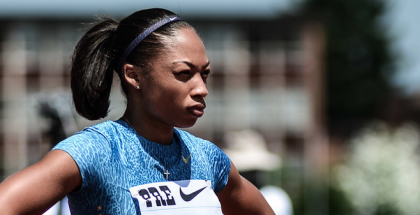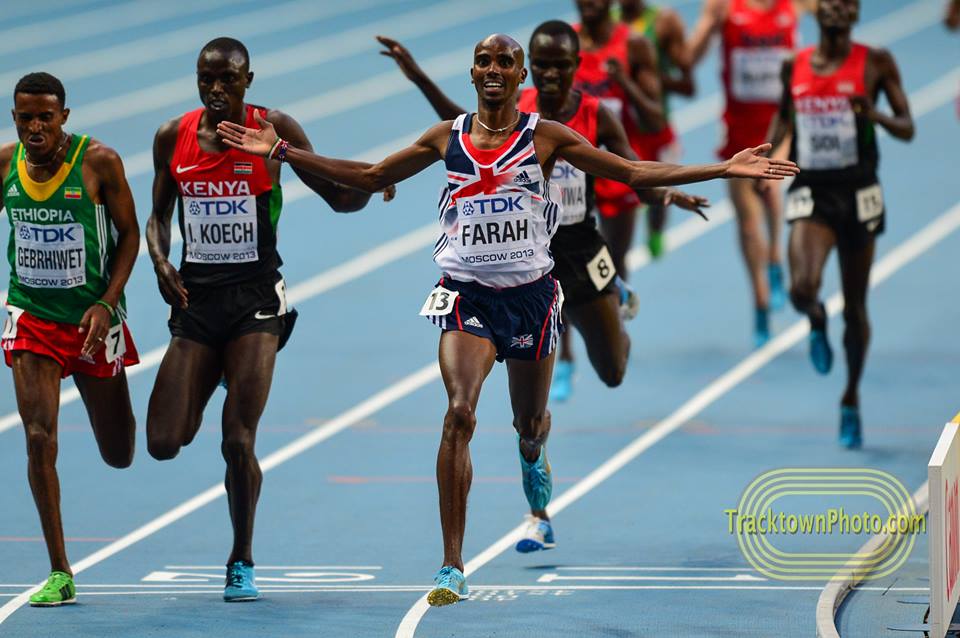The Dual: The Rules Problem in Track and Field
Kevin Sully | On 09, May 2013
The Dual is a two-person discussion about issues surrounding the world of running and track and field. In the first installment, Jesse and Kevin debate the controversial Texas high school 4 x100 disqualification and the role that rules play in track and field.
A story gaining much traction on the internet over the last few days refers to a disqualification of a high school 4×100 relay team in a Texas regional final.
Yahoo! sports blog “Prep Rally” leads with the headline Texas teen points to heavens, gets 4×100 relay squad banned from state championships. Columbus High School’s relay team got the DQ after the anchor leg, Derrick Hayes, pointed upwards at the finish line. Hayes’ father told local press that it was an act of faith:
“He put his hand by his ear and pointed to the heavens… It was a reaction. You’re brought up your whole life that God gives you good things, you’re blessed.”
It caused quite a furor and even Texas governor Rick Perry urged the University Interscholastic League (Texas’ high school federation) to investigate. After talking to many eyewitnesses including coaches, athletes, and parents, and reviewing video, the UIL has backed up the referee’s ruling.
Their investigation and report makes it appear to be a garden-variety unsportsmanlike conduct disqualification. Key quotes from the UIL report:
Based on the UIL’s investigation, the student athlete raised his hand and gestured forward at the conclusion of the 4×100-meter relay. The meet official approached the student-athlete in an effort to warn him of a possible disqualification should that behavior continue. In the opinion of the official, the student reacted disrespectfully. Based on his reaction, the student-athlete was subsequently disqualified. Any decision to disqualify a student-athlete at any track meet must be upheld by the head meet referee. The meet official and the meet referee conferred, and the disqualification was upheld on-site. At no point during the discussions surrounding the disqualification at the meet was the issue of religious expression raised by any parties.
…the student-athlete’s parents submitted a letter [to the UIL] stating that their son’s religious freedoms were not violated. …”we realize that Derrick could have handled the win in a different manner,” KC and Stacey Hayes said in the letter. … “After discussing this with our son, we have come to the conclusion that his religious rights were not violated.”
It looks like it was as simple as this: kid taunts, official gives him a warning (not an immediate DQ), kid mouths off, subsequently gets DQed, parent tries to justify kid’s poor behavior.
As a teacher of 18 years, I can tell you that a parent trying to excuse his son’s bad decisions instead of telling him to grow up and accept the consequences is not rare enough to be “news.” I guess the only difference here is that the father knew what culture-war buttons to push in Texas.
I pretty much agree with your assessment. Although, does the kid and his parents get a little bit of credit for eventually telling truth and taking responsibility?
I’m interested to know what exactly the athlete said/did, but seeing how quickly the family backtracked, it was more than likely warranted. It is hard not to be skeptical when stories of overzealous track officials arise. Anyone who has ever been around a high school track knows stories of absurd disqualifications.
At some point, track and field in high school became intensely focused on rules; many of which are only loosely related to athlete safety or fair play. Obviously regulations are necessary to avoid chaos, but the problem in track is that the application of the rules is both arbitrary and unforgiving. In other sports the level of penalty is much more gradual, a technical foul in basketball, a point penalty in tennis, etc. Track usually jumps straight to disqualification. Even when the disqualification is called for (like our example from Texas) it seems a bit misguided to end an entire team’s season because one athlete essentially earned a red card.
The result is that track and field officials have a disproportionate amount of influence in a sport that has one of the most complex and diverse rulebooks. Coaches, athletes (and well intentioned officials) are often times in the dark about about all the specifics. The few that do know, make the decisions, often times at the expense of common sense.
Which brings me, finally, to my question. The two most recent rules flaps in professional track are the tie in the women’s 100 at the Olympic Trials and Usain Bolt’s false start in the 2011 World Championships. These are two entirely different situations, but to what extent are they reflections of systemic rules issues within track and field?
The problem in track and field is that there is no way to penalize an athlete without disqualification. We can’t give the opposition two free throws, or fifteen yards and a first down. It’s the big drawback to the essential simplicity of the sport.
Which is, by the way, generally a good thing. Aside from a DQ, it’s always been harder in track and field for an official to screw over one athlete in favor of another because judgement calls are such a small part of the sport, and it’s even harder now. We have used technology to almost completely eliminate the human element of officiating. Cameras instantaneously know who finished in what place (well, with one notable exception). Pressure-sensitive blocks tell us when someone has false-started. Toeboard cameras can definitively say if a jumper or thrower fouled. Even mass-participation events of 10,000 runners or more would be essentially impossible without chip timing–and we can use them to catch Kip Litton, too. FIFA is only now getting around to using goal-line technology in the way we’ve been using finish-line technology since the 1930s.
In the case of a false start, I’d like to see a 19th-century “house rule” become the 21st-century international standard. Anyone who false-starts stays in the race but gets their starting line get set back one meter. It’s a significant penalty but doesn’t result in a DQ.
High school uniform rules are the worst and they seem to change a little every year. I think it’s because there’s no way the track and field rules committee at the annual NFHS convention could meet up and say “Yep, rules are good, we don’t need to change anything, let’s head to the bar.” Every other sport has changes to strategies and style of play, so new rules and interpretations are necessary. But the basic rules of competition in track and field are the same now as they were a hundred years ago and we like it that way.
Agree on the uniform rules. Track coaches have enough to manage without having to worry about which shade of compression shorts the relay team is wearing. Ditto on jewelry.
But back to the pros….What about Tarmohgeddon? Clearly the USATF should have had a policy in place, however, I think the handling of the tie revealed some inherent problems with track and field that are present at every level. In what sport would the parties involved in the dispute be the ones to render a decision? The USATF was present in the meeting, but the athletes, their coach and their agents were also there.
I think the problem with the Felix/Tarmoh mess was that USATF’s officials were afraid of being too heavy-handed with a decision, which is kind of the opposite problem of the high school situation that touched off this discussion.
USATF’s previous name, when it was created out of the AAU in the late 70s, was “The Athletics Congress.” It was supposed to operate similarly as the Congress in Washington, and it seems to have lived up to that horrible model. Like the other Congress, USATF is responsive to constituents, but some have more clout than others. And in Washington, parties involved in a dispute do get to be ones to render a decision, just like in Tarmohgeddon. What a mess.
So would you say that we want track and field officials to make both strong and wise decisions, and they sometimes fail at one or both?
Interesting distinction. Unquestionably, track and field benefits from strong and wise application of the rules, but does that address the issue of the rules themselves? Most of the issues with officials and meet management would be alleviated if the rules were just written clearly and applied consistently.
Does anybody know what it really means to run under protest? Or why it is allowed in certain situations but not in others? How about at the Pre Classic in 2011 when Felix (I hate to keep picking on her) clearly false started in the 400?
I suspect the question about “running under protest” is rhetorical.
Hmmm… “if the rules were just written clearly and applied consistently. ” I doubt we’re alone in that problem, in sports or anywhere else.



















Submit a Comment